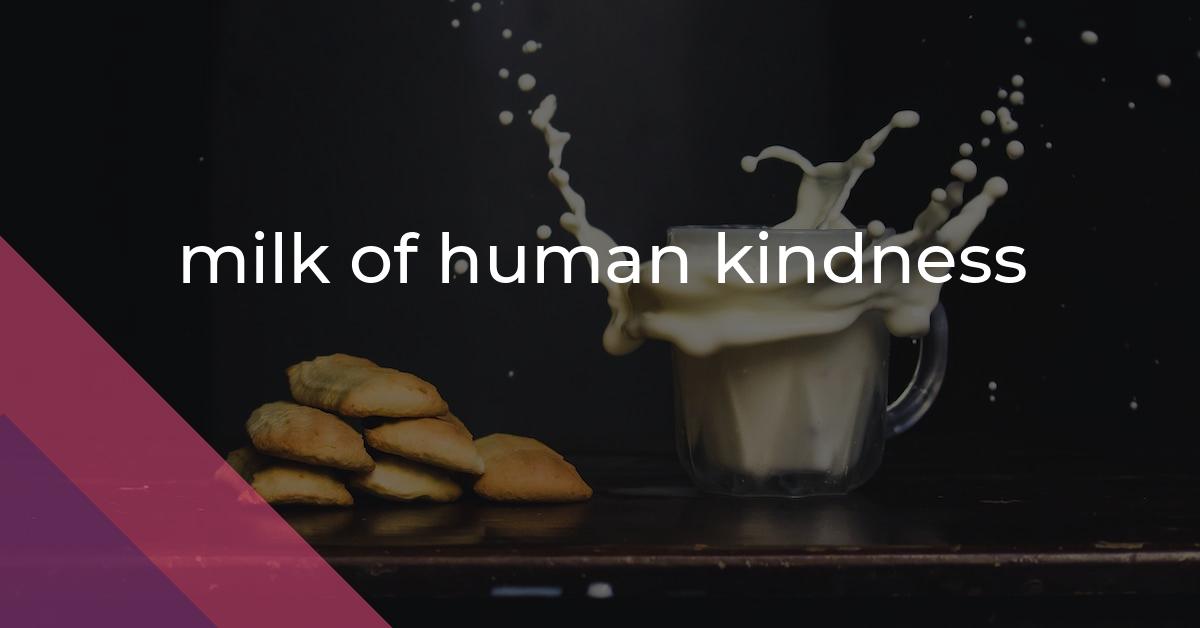milk of human kindness: Idiom Meaning and Origin
What does ‘milk of human kindness’ mean?
The idiom "milk of human kindness" refers to compassion, benevolence, or the innate goodness found in people.

Idiom Explorer
The idiom "too good for this world" is used to describe someone who is exceptionally kind, pure-hearted, or virtuous, to the extent that their qualities and actions seem too extraordinary for the flawed or corrupt world they live in.
The idiom "salt of the earth" refers to someone who is genuine, honest, and of great moral character. They are dependable, hardworking, and humble, making them an essential and valued member of society.
The idiom "of a kind" is used to describe something or someone that is similar to something or someone else, but not exactly the same. It implies a resemblance or similarity between two things, but also highlights their unique qualities or differences.
The idiom *mercy fuck* refers to a sexual encounter that is done out of pity or compassion rather than desire or attraction. It implies that one participant is engaging in the act only to alleviate the other's suffering or loneliness.
The idiom "man of the people" refers to an individual who is relatable and well-liked by the general public. This person typically exhibits qualities of being down-to-earth, approachable, and in touch with the concerns and needs of ordinary people.
The idiom "manners maketh man" means that a person's behavior and social graces are a true reflection of their character and can have a significant impact on how they are perceived by others.
The idiom "make someone's day" means to do something that brings joy or happiness to someone, often by doing a small act of kindness or providing a pleasant surprise.
The idiom "lion-hearted" is used to describe someone who is brave, courageous, and fearless in the face of danger or adversity. It comes from the idea that a lion is the symbol of bravery and strength.
The idiom "human touch" refers to the personal connection or interaction between people, often emphasizing the warmth, empathy, and understanding that can be conveyed through physical contact, gestures, or personal attention.
A Benevolent Potion
The idiom "milk of human kindness" is a phrase commonly used in the English language. It has its origins in Shakespeare's play Macbeth, specifically in Act 1, Scene 5. Lady Macbeth uses this phrase to express her concerns about her husband's ambition and lack of ruthlessness. She fears that he is too compassionate and kind:
"Yet do I fear thy nature; It is too full o' the milk of human kindness."
The idiom "milk of human kindness" figuratively represents the innate compassion and sympathy that humans possess. It reflects the idea that mankind has a natural tendency to be benevolent and caring towards others.
The term "milk" is derived from Old English "meoluc" and Middle English "milke," which both trace back to the Proto-Germanic "meluks."
The phrase "of human kindness" means possessing qualities or attributes related to humanity's inherent benevolence. The term "kindness" itself comes from Old English "cynednes," meaning "the state or quality of being kind."
When examining the usage of this idiom, it becomes clear that it is often used to highlight acts of kindness or compassion, or to evoke introspection about one's own capacity for empathy and care. It is frequently used in contexts that emphasize contrasting qualities, such as when someone's "milk of human kindness" is tested or when individuals display an absence of kindness.
One related idiom is "heart of gold." This phrase is used to describe someone who is exceptionally kind and caring. Just like the "milk of human kindness," a person with a "heart of gold" is innately compassionate and goes out of their way to help others.
Another related idiom is "better nature." This idiom refers to a person's inherent inclination towards doing what is right and good. It suggests that individuals have a natural tendency to act in a positive and compassionate manner.
A similar idiom is "good-hearted." This phrase is used to describe someone who is genuinely kind and caring. It reflects an individual's true nature and their willingness to help others without expecting anything in return.
"better angels" is another related idiom. This phrase refers to one's inner moral compass or conscience. It implies that individuals have an inherent ability to make righteous and compassionate choices.
Lastly, there is the idiom "good turn." This phrase is used to describe an act of kindness or favor done for someone else. It suggests that helping others is a noble action that demonstrates one's compassion and willingness to make a positive impact.
While the idiom "milk of human kindness" is relatively well-known and frequently used, its usage has somewhat declined over the years. Nonetheless, it still finds its way into literature, conversation, and various media as a way to explore and discuss human nature, morality, and the capacity for empathy.
The idiom "milk of human kindness" holds a significant place in the English language, thanks to its impactful usage in Shakespeare's Macbeth. Through its enduring presence, it continues to prompt reflection on the inherent compassion and kindness that exists within each individual. It serves as a reminder of our shared humanity and the importance of empathy. Furthermore, related idioms such as "heart of gold," "better nature," "good-hearted," "better angels," and "good turn" further highlight and expand upon the concept of human kindness and the positive qualities that define our interactions with others.
Example usage
Examples of how the idiom "milk of human kindness" can be used in a sentence:
- Despite facing adversity, she always displays the milk of human kindness and goes out of her way to help others.
- The politician's campaign slogan was focused on the milk of human kindness, promising to prioritize the needs of the less fortunate.
- Even though the situation seemed hopeless, the stranger showed the milk of human kindness by offering her umbrella to the person caught in the rain.
More "Kindness" idioms



